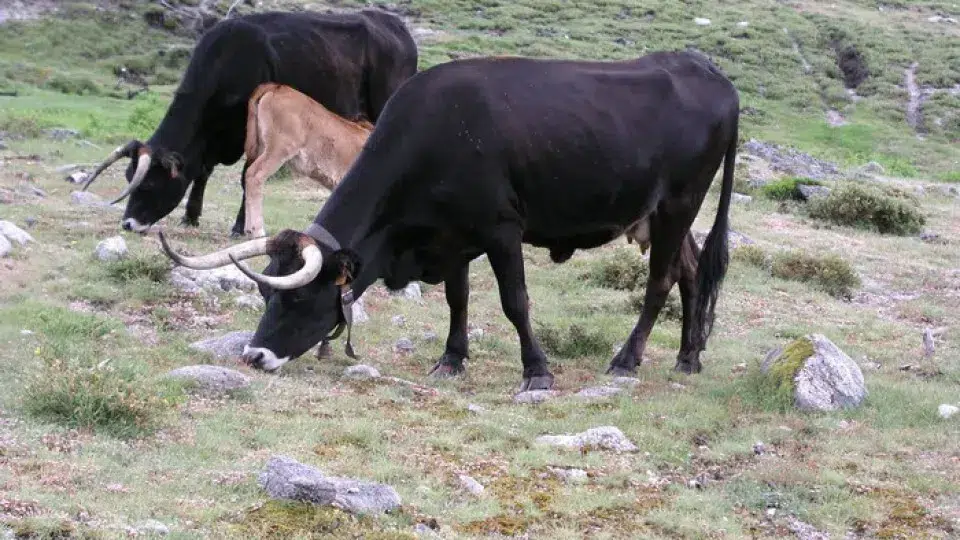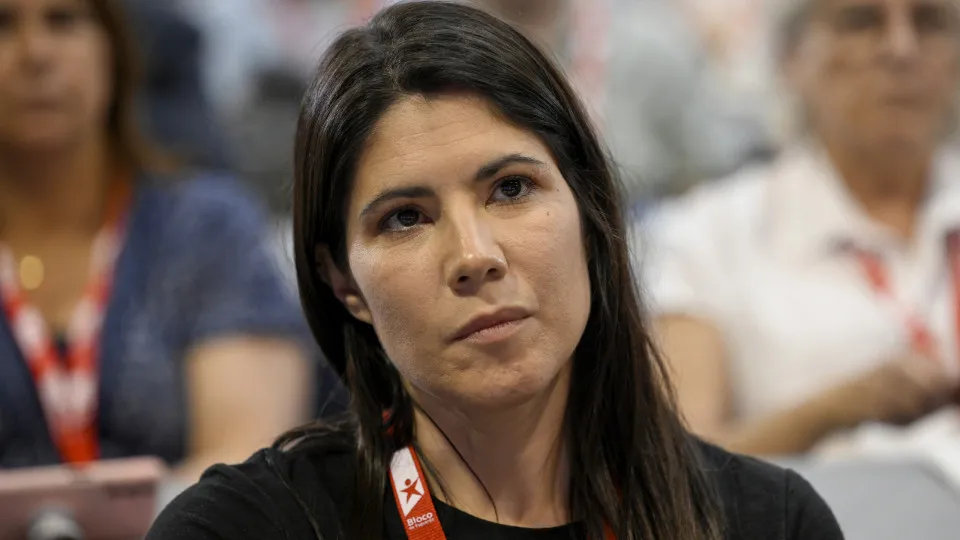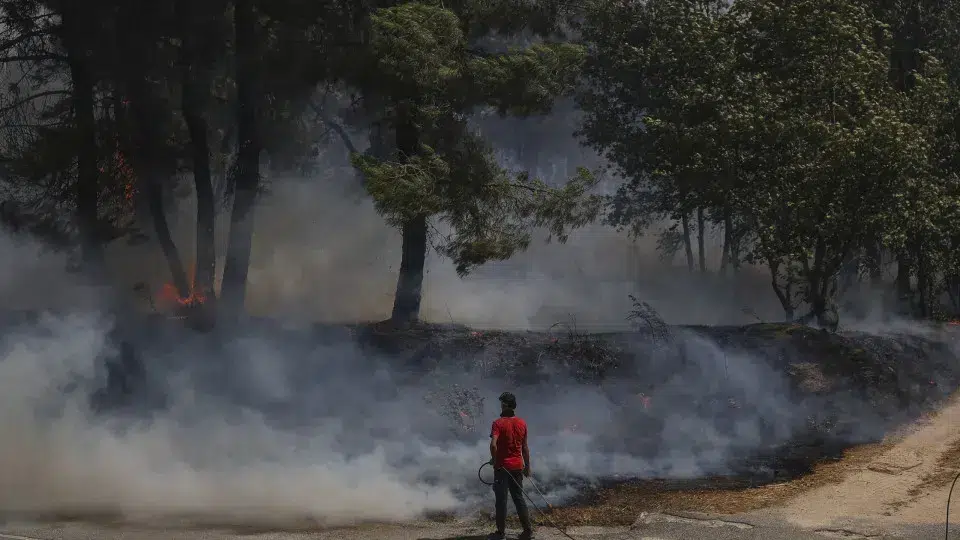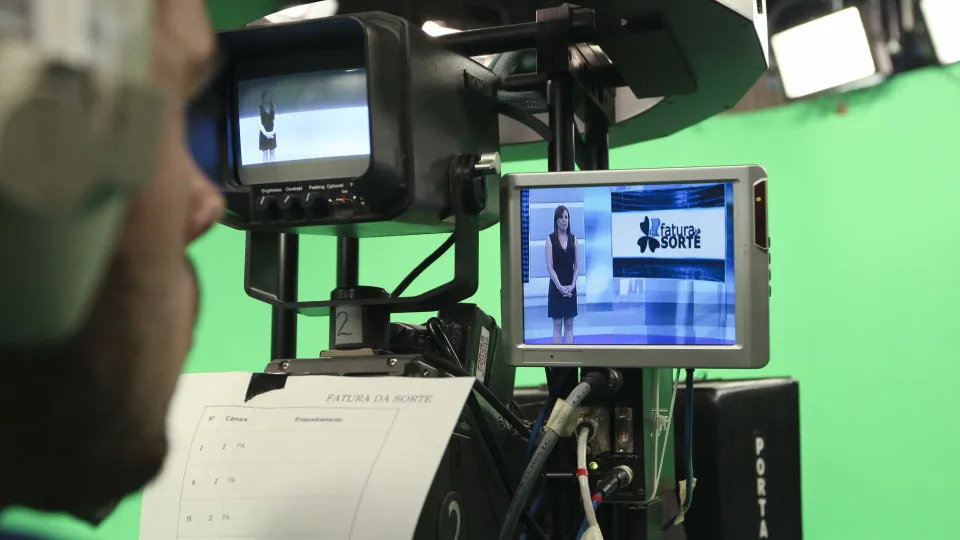
“It is a time when the animals were left without a square meter of pasture; it burned right up to the stable doors, and the animals need to eat daily, we cannot wait for the vegetation to regenerate,” said Avelino Rego, a maronese cattle producer in Alvadia.
Following the fire on the 8th that destroyed the pastures and spread between Favais, Alvadia, and Lamas in the Alvão mountain range, Ribeira de Pena, food was distributed today for the animals to help alleviate the impact.
The 64 bales of straw and 64 of hay were donated by a group of entrepreneurs and individuals from Leiria, who rallied after witnessing the destruction wrought by the fire. Additionally, farmers from Grândola contributed, with transportation covered by the Portuguese Farmers Confederation (CAP) and the municipality of Ribeira de Pena.
“We managed to help and show unity with the people of Favais, who were completely surrounded by the fire,” added Avelino Rego, noting that nearly “100% of the pasture area was affected.”
In these villages of the Alvão mountains, many residents depend on maronese cattle production. The production method is extensive, and the cattle graze on the hills daily. However, after the fire blackened the mountains, producers had to use their winter reserves to feed the cattle.
With 10 maronese cattle, Venâncio Faria stated that he was left “without any pasture” and that today’s assistance was crucial for feeding his animals, which he had been feeding with corn and hay from the reserves he intended to use starting in October.
“They are already eating it now, and all the meadows around here have burned,” he remarked.
His cattle have been leaving the barn daily, being put in a field where he leaves some corn.
“I’m already feeding them corn that was meant for grain,” he explained, stating that the fire caused significant damage for these producers and beyond, as “everything, including meat, will become more expensive.”
He emphasized that not having to feed the animals will increase costs significantly. “It’s bad for the whole country, not just us,” he stressed, recalling that the Alvão mountains in Vila Pouca de Aguiar, Vila Real, and Mondim de Basto, and much more across the country, have burned.
Moreover, he noted that the burned meadows “will never produce hay as they did.”
Venâncio Faria described a “huge sadness” and recalled that, on the 8th, the village was completely surrounded by fire within hours.
Flávio Costa Gaspar, who has 10 maronese cattle and five calves, said he has been feeding the animals with green corn and hay.
“Normally, at this time, we wouldn’t be using hay,” he mentioned, adding that some producers have no place to leave the cattle, so they remain in the barns.
For this producer, today’s aid “is very important” because, around here, “you can’t find hay to feed the cattle” or “brush to make bedding.”
Fernandina Costa has two adult cattle and four younger ones and said that now they can’t even roam the hills because everything burned. “They have nothing to eat, nothing. We are worried about how they will survive in the coming years because nothing will grow back soon,” she noted.
These are, she explained, “cattle that roam the hills, not ones that stay in barns.”
Having no connection to Favais, Luís Sousa said the initiative by entrepreneurs and individuals from Leiria aimed solely to help those most in need due to the fires ravaging the country.
“We assessed the needs and got to work. We used social media for good and started a fundraising movement,” said the entrepreneur.
“This is a contribution from the farmers of Portugal, in this case from Grândola. We had a large group of farmers from the south offering straw and other types of food. This is the farmers’ first need because they were completely left without pasture areas, and their needs are urgent,” stated Francisco Pavão from CAP.
Avelino Rego argued that a “serious investment” is necessary in these burned areas so that the cycle that culminated in fire does not repeat itself, hoping for the opening of specific investment programs in these areas.
The Alvão mountain range spans Vila Pouca de Aguiar, Ribeira de Pena, Vila Real, and Mondim de Basto, and in the early weeks of August, areas across these four municipalities burned in three different fires (Sirarelhos, Pinduradouro, and Alvadia).
In this month, over 7,100 hectares in the Alvão range are reported to have burned.
Leia Também: The moment a cow saves its calf from a leopard attack in India




